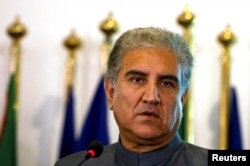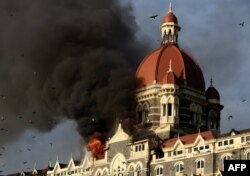Pakistan disclosed Monday that neighboring India has hinted at the possibility of the two nuclear armed nations reviving long-stalled talks.
The announcement comes as the newly-elected government of Prime Minister Imran Khan takes charge in Islamabad after his Pakistan Tehreek-i-Insaf party won last month's general elections.
Shortly after being sworn in to office, Foreign Minister Shah Mehmood Qureshi said a letter from Indian Prime Minister Narendra Modi congratulated Imran Khan and "conveyed a message of initiating a process of dialogue."
"That is a very positive gesture," noted Qureshi.
There was no immediate official reaction from India, although Indian media have confirmed and reported details of Modi's letter to Khan.
In his first official communication with the new Pakistani government, Modi called for bilateral engagement, according to The Hindu, an Indian daily newspaper.
"The Prime Minister expressed India's commitment to build good neighborly relations between India and Pakistan and pursuing meaningful and constructive engagement for the benefit of the people of the region," the paper quoted official sources as saying.
The Press Trust of India said Modi conveyed to his Pakistani counterpart that New Delhi is "looking for constructive and meaningful engagement" with Islamabad.
In his first news conference, Qureshi acknowledged that the issues straining bilateral ties, including the territorial Kashmir dispute, are complicated and may not offer "immediate or easy solutions."
He cautioned, however, that Pakistan and India are two nuclear powers and have no option but to come to the table for talks. "We need to engage in a continued and uninterrupted dialogue because, in my opinion, this is the only and wise path available for both of us," Qureshi said.
Islamabad's traditionally strained ties with New Delhi have deteriorated since the inception of Modi's government in India.
Bilateral tensions have led to frequent deadly military skirmishes along the disputed Kashmir border over the past couple of years, prompting fears of another war between India and Pakistan over the divided Himalayan region. Both countries claim the region in its entirety.
Amit Baruah, a longtime observer of India-Pakistan ties and New Delhi-based resident editor of The Hindu, welcomed the apparent thaw in ties.
"Contact and dialogue are a must if India and Pakistan are to address their differences," Baruah said.
The Indian leadership has until now demanded that Pakistan prosecute suspected Islamist militants for their role in the 2008 Mumbai terror attacks that killed more than 166 people, including several U.S. citizens.
Pakistan says a lack of cooperation and solid evidence from India have hampered prosecutors trying to persuade the anti-terrorism court to expeditiously try those cases.
Afghanistan
Separately, Qureshi said he intended to establish contact with the Afghan foreign minister, Salahuddin Rabbani, on Monday to plan a visit to Kabul to bring a "solid message" to the Afghan nation that peace and security in Pakistan are linked to stability in their country.
"Our future is interlinked, our geography is interlinked, our peace and stability are interlinked. We need each other and we have to support each other to begin a new journey. This is the message and mature thinking I intend to present before the leadership of that country," said the Pakistani Foreign Ministry.
Pakistan-U.S. ties
Qureshi said the new government will promote mutually beneficial relations with the United States "on the basis of equality and mutual respect" for each other's national priorities.
"I am certainly not ignorant about the mutual trust deficit and we have to bridge it. I will want to listen to their point of view and I will present mine as well to move forward on how we reduce the trust deficit," Qureshi noted.
The government of U.S. President Donald Trump cut civilian financial aid to Pakistan this year. Additionally, Trump stopped all military assistance to Pakistan, saying Islamabad must take decisive action to root out militants waging deadly attacks on U.S. forces in Afghanistan.
Pakistan has rejected the charges, saying they stemmed from U.S. military failures to end the Afghan war. The allegations and counter-allegations have sent U.S.-Pakistani relations to new lows.
The Trump administration welcomed newly-elected Prime Minister Khan after he was sworn in on Saturday and described the bilateral relationship spanning more than 70 years as vital.
"The United States looks forward to working with Pakistan's new civilian government to promote peace and prosperity in Pakistan and the region," State Department spokeswoman Heather Nauert said Saturday.












